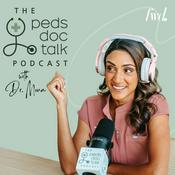As parents, many of us want to raise kind, empathetic kids, but we don’t always feel equipped to talk about race, bias, and identity in everyday life. In honor of Black History Month, this conversation feels especially important. I sit down with culturally responsive therapist Anjali Ferguson to unpack how early children begin noticing differences and how small, ordinary moments shape their understanding of the world.
We talk about the discomfort adults feel, the fear of saying the wrong thing, and why silence often teaches more than we realize. This episode is not about blame. It is about giving families tools to move forward with intention.
Dr. Ferguson brings both professional expertise and deeply personal experience as a South Asian woman raising biracial South Asian and Black children. Together we explore how culture, trauma, and identity intersect in parenting, and why these conversations are not optional extras, but foundational to raising emotionally healthy kids. Her children’s book, An Ordinary Day, shows how subtle bias can show up in everyday childhood experiences and how families can use those moments to build empathy instead of fear.
My hope is that this episode helps parents feel less frozen and more ready to start small, stay curious, and keep showing up.
We discussed:
• Why kids notice race and differences earlier than most adults expect
• How racial bias forms in early childhood
• The gap in culturally responsive parenting resources
• Growing up between cultures and identity formation
• Raising biracial children and protecting cultural identity
• Everyday microaggressions and their long-term impact
• How racism creates chronic stress in the body
• Generational trauma and epigenetic effects
• The role of racial socialization in protecting children
• Why avoiding conversations about race harms kids
• How parents can respond when bias shows up in real time
• Teaching empathy through ordinary daily moments
• Building diverse environments through books, toys, and media
• Supporting kids when they experience exclusion or bias
• Why parents don’t have to be perfect to start
• Practical ways families can talk about race at any age
To connect with Dr. Anjali Ferguson follow her on Instagram @dranjaliferguson, check out all her resources at https://draferguson.com/ and buy her book “An Ordinary Day”: https://www.amazon.com/Ordinary-Day-Dr-Anjali-Ferguson/dp/B0B8BDNXVK
Additional Resources:
www.parentingculture.org
00:00 The Hidden Impact of Microaggressions
00:56 Why This Conversation Matters During Black History Month
02:57 Representation in Parenting Spaces
06:34 Dr. Anjali’s Personal Story: Culture, Trauma, and Identity
10:42 Racism as Trauma: A Professional Awakening
14:30 Parenting Biracial Black Children
19:32 When Do Kids Notice Race?
24:56 Inside An Ordinary Day and Why It Matters
31:37 Chronic Stress, Racism, and Long-Term Health
37:13 What to Say When Bias Happens
42:51 Why Every Family Must Talk About Race
47:18 You Will Mess Up, And That’s Okay
Our podcasts are also now on YouTube. If you prefer a video podcast with closed captioning, check us out there and subscribe to PedsDocTalk.
Get trusted pediatric advice, relatable parenting insights, and evidence-based tips delivered straight to your inbox—join thousands of parents who rely on the PDT newsletter to stay informed, supported, and confident. Join the newsletter!
And don’t forget to follow @pedsdoctalkpodcast on Instagram—our new space just for parents looking for real talk and real support.
We love the sponsors that make this show possible! You can always find all the special deals and codes for all our current sponsors on the PedsDocTalk Podcast Sponsorships page of the website.
Learn more about your ad choices. Visit podcastchoices.com/adchoices



